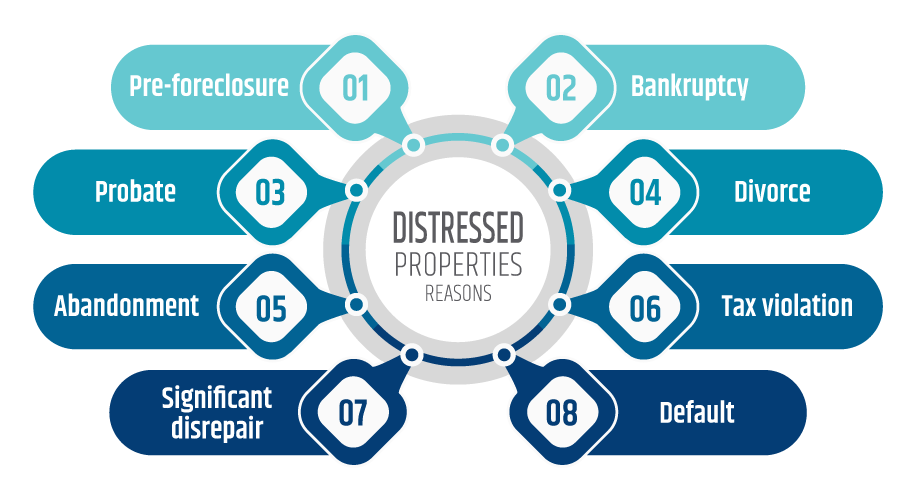
The real estate business is the fastest-growing business in the world as it is an excellent source of long-term investment and has high-profit margins, which is why wholesalers try to purchase more and more properties at good locations to expand their business. However, finding distressed properties leads is not an easy task, yet it requires great experience and an effective strategy to find suitable properties and close deals. This guide will teach you everything you need regarding how to find distressed properties to buy in bulk, from finding the most important signs to using data tools and methods to find distressed property leads.
“The properties or homes that are available for foreclosure or are facing some legal pressure on them and are already on the tagged list for getting sold. Such properties are said to be distressed properties. Wholesalers target these properties and buy them from the motivated sellers for less than the market rate.”
Typically, the condition of these properties or the owner’s urgent necessity of selling it causes them to sell at a lower price than the market’s worth. A defaulted mortgage, tax liens, or essential repairs the owner cannot pay are all causes of distress.
In pursuing possible discounts, investors often look for foreclosed homes to renovate and resell for a profit. On the other hand, acquiring distressed homes may be hazardous because they may include complicated legal challenges, or hidden repair expenditures.
Distressed properties are an asset for wholesalers because they can profit most from them. People who want to sell their distressed property find themselves in the hassle and urgency of selling the land, eventually benefiting real estate wholesalers. These assets enable wholesalers to get contracts at substantially reduced prices, giving them a large profit margin when selling to end purchasers.
Due to the imperativeness of distressed property, wholesalers may close agreements quickly. Wholesalers have greater freedom in arranging agreements since distressed property owners are more open to inventive financing or unusual proposals. Many markets have a steady supply of distressed homes, giving wholesalers a constant stream of transactions to expand. Realtors may also use distressed homes to reduce homeowners’ problems, generate recommendations, and repeat business.


There are several methods to find distressed property leads that wholesalers can use, such as:
For more detailed information about these methods, check out our blog, “12 Ways to Find Real Estate Wholesaling Leads.”
Advantages | Disadvantages |
Distressed properties present investors with a unique opportunity to purchase them at a discounted price, offering the potential for a favorable return on investment. | Properties in bad shape often need significant changes and renovation, which is costly and time-consuming. |
Due to the more affordable purchase price, a greater return on investment (ROI) can be achieved when the property is flipped or rented. | Standard loans can be difficult for foreclosed homes in bad shape or with legal problems. Investors might need cash or loans for hard money. |
The number of buyers showing interest in distressed properties has declined, resulting in less competition and a higher likelihood of finding a favorable deal. | Some foreclosed homes have title problems, such as liens, missing taxes, or other issues that must be fixed before buying. |
Investors can enhance a property’s value by making renovations, repairs, and improvements, which can greatly boost its market value. | The chance of making money depends on the market’s performance. A drop in the market could lower the value and make it less profitable to sell. |
Those selling distressed properties are typically eager to make a quick sale, which allows investors to secure more favorable terms and prices through negotiation. | Property taxes, insurance, utilities, and care must be paid while the property is fixed up or until it sells. |
Investing in distressed properties can be an excellent opportunity for new investors or wholesalers looking for a more affordable entry point. | Unexpected fixes or changes in the market can make it harder for troubled homes to make money, leading to unclear results. |
Distressed properties present unique opportunities for exploring alternative financing options, including seller financing or subject-to-arrangements. | Finding, analyzing, buying, and fixing up foreclosed homes can take a long time and a lot of work. |

Real estate wholesalers who want to optimize their profit margins must know how to find distressed properties. Wholesalers may rapidly find distressed properties with potential by using successful techniques, including driving for money, examining public records, and utilizing data tools like PPC, SMS marketing, and cold calling.
Legal complexities and market swings are two examples of obstacles that must be anticipated and planned for. Mastering the art of finding distressed properties through careful planning and investigation can lead to profitable investments and substantial company development.

Quick Links
Contact Us
All Rights Reserved | Sitemap | Real Estate SMS Marketing ©2024